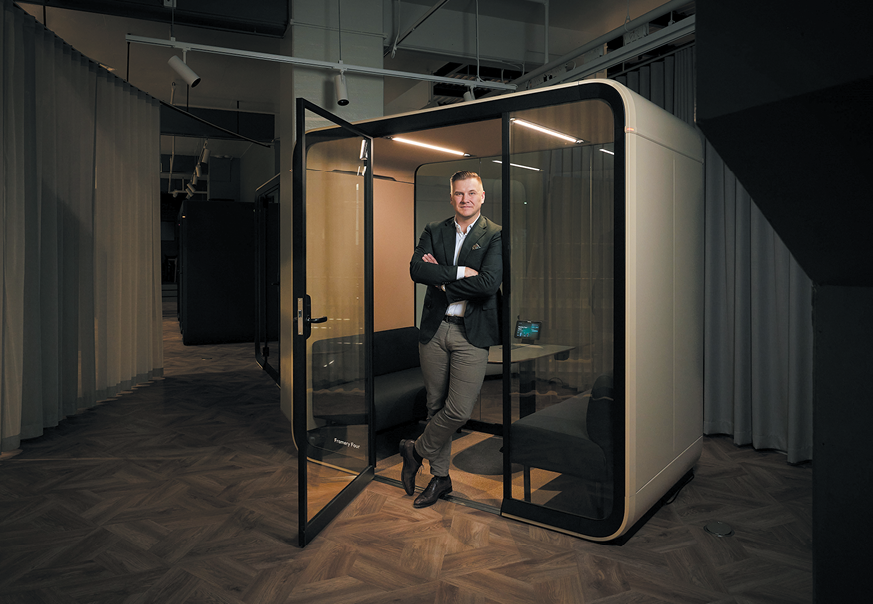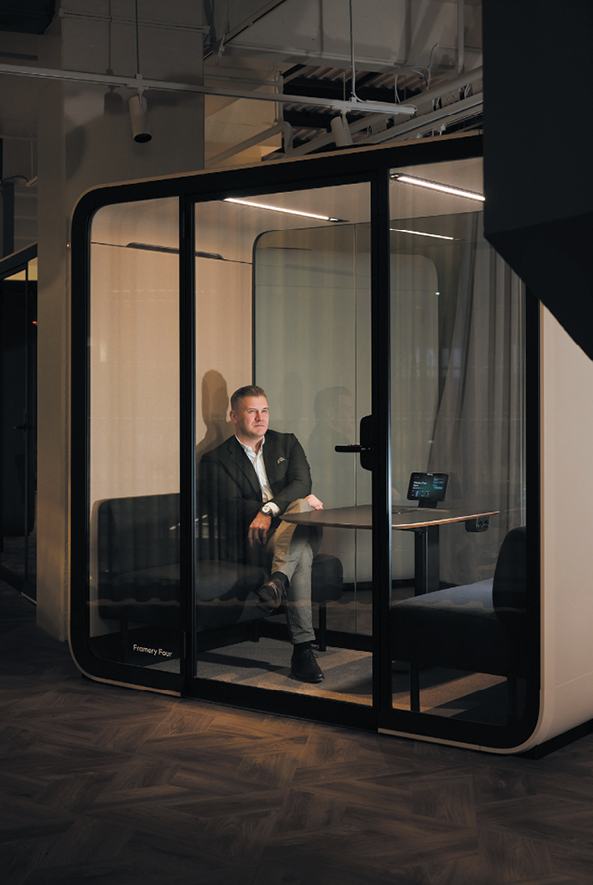- Home
- Media Kit
- MediaJet
- Current Issue
- Past Issues
- Reprints (PDF)
- Photo Specifications (PDF)
- Contact Us
- PRIVACY POLICY
- TERMS OF USE
![]()
ONLINE
![]()
ONLINE

Creating The
Ultimate Workspace
Editors’ Note
Samu Hällfors is the mind behind today’s office revolution. As the founder and CEO of Framery, he invented the first office pod in 2010, igniting a multi-billion-dollar industry that’s transforming workplaces worldwide. Today, Hällfors’ innovation is fundamentally changing how offices look and function. His influence is the driving force behind the modern office’s renewed focus on privacy and well-being in the post-pandemic era.
Company Brief
Framery (framery.com) is an industry pioneer and global leader in engineering and manufacturing soundproof pods, services, and solutions that enable people at work to focus on what really matters and get things done. Framery is a necessity for a successful workday for millions of knowledge workers around the globe in many of the world’s leading companies, including Tesla, Puma, and Microsoft.

Samu Hällfors in Framery’s privacy pods (above and below)
Will you highlight the history of Framery and how the company has evolved?
I founded Framery in 2010 when I was in my early twenties working for a software company. We had an open-plan office, and I found it nearly impossible to concentrate there. The constant noise, particularly from our boss’ phone calls, was incredibly frustrating. My friend and I suggested he take his calls elsewhere, and he responded, “Well, buy me a phone booth.” The problem was, there weren’t any on the market, so we decided to make one ourselves. We soon realized that many workplaces faced the same issue with no available solutions. Recognizing that people want to excel in their roles but are hindered by disruptions in open-plan offices, we saw an opportunity. Constant distractions like phone calls and impromptu meetings made it hard to focus. Inspired by the need for a solution, we created soundproof spaces where workers could concentrate or hold private video calls.
The product took off, and today we are the global market leader. In fact, Framery is used by 70 percent of the largest companies in the world.
What have been the keys to Framery’s industry leadership and how do you define the Framery difference?
We have been laser focused on having the best product on the market. This year we took a huge leap by launching the ultimate privacy pod – our smart pod family – leaving traditional office meeting rooms and previous soundproof pods far behind. The pods come with all the classics we’re known for like industry leading soundproofing and ventilation, but also go far beyond that. The technology built into the Smart Pods has been entirely designed to reduce frustrations with the workplace and enhance the meeting experience. Most people spend a lot of time at work, so we wanted to remove all of the headaches and provide a perfect space so people can really focus on what matters. For example, this has meant providing features like adaptive airflow, sound masking, as well as creating the perfect lighting modes for regular meetings and video conferencing. To create a seamless experience, each of the smart pods can be connected to each other and collect anonymous real-time data on usage, allowing the pods to be booked easily via the Framery app – ensuring people never have to waste time looking for a meeting room.
But the role of pods doesn’t end there. We wanted to create a product that pushes the boundaries of circularity. The new smart pods are designed to last decades, they are modular which means they can be retrofitted over time, and they are 100 percent recyclable so that when they reach EOL, they are not part of the problem, but the solution.

How do you describe Framery’s culture and values?
As companies grow, bureaucracy and office politics often seem inevitable. When our team surpassed 400 people last year, we committed to combating these issues because I despise “corporate clutter.” We’ve dedicated thousands of hours to prevent mediocrity, a common problem in expanding organizations.
Many companies discuss values like transparency, low hierarchy, and employee well-being, but often these are just words. We decided to prioritize these values as vigorously as our top business goals, and the difference has been incredible. Here are some examples of how we are driving our culture and fighting against becoming average.
Where do you see the greatest opportunities for growth for Framery?
Research shows that the top perk encouraging employees to visit the office more frequently is access to focus spaces. Employers who will thrive in the new era of hybrid work – and attract and retain top talent – are those who make the office experience worthwhile for their employees. Our mission is not only to create the ultimate workspace, but also to democratize it. This means making our solutions financially accessible. This year, we launched the most advanced and environmentally friendly line of pods yet, and we made them more affordable than the previous models they replace. On average, our pods are less expensive than meeting rooms of equivalent size, offering far more benefits for both companies and employees.
Will you discuss Framery’s commitment to sustainability?
We want to change our industry for the better. Building materials and construction contribute 11 percent of global emissions – and office furniture, currently, is the biggest single contributor to global furniture waste. So, we set out to create the most sustainable office pod on the market to meet the enormous demand for high-quality meeting and focus spaces. Unlike traditional meeting rooms, our pods are designed to be repurposed and reused for decades, and are still 100 percent recyclable at the end of their life cycle. They are also made with partly recycled steel, aluminum, glass, and fabrics. We will also be among the select few companies in the world pioneering the use of SSAB fossil-free steel in our products, starting as soon as the material becomes available in 2026.
Our objective is to halve our total product emissions by 2028 while increasing our deliveries. Although this is a significant challenge, we are on track and will continue to innovate relentlessly to lower emissions.
How important is it for Framery to build a diverse and inclusive workforce?
I believe that building a diverse and inclusive workforce is not just nice to have – it’s essential. Bringing in a mix of perspectives helps us see the bigger picture and think outside the box, and we maintain a flat hierarchy to ensure open access to people and information. Our commitment to diversity, equity, and inclusion not only makes every Framerian feel valued, but also expands our talent pool. We also actively combat discrimination and harassment and analyze our compensation practices to ensure equity. In simple terms, we are dedicated to building a culture where everyone feels they belong, aligning with the UN Global Compact principles.
What do you see as Framery’s responsibility to be engaged in the communities it serves and a force for good in society?
Our credibility in all things sustainable requires full transparency. At Framery we measure our impact on society and the environment annually, and were pleased to find that in 2023 Framery had a net impact ratio of more than 20 percent. That indicates that we create more aggregate value compared to the resources we use. Our effort goes far beyond cutting emissions; it’s about making sure we give back to society and our employees, too. In operations, we measure our impact in three main focus areas: Climate and Environment, People and Society, and Fair Business, and we publish results in all three in accordance with GRI Sustainability Reporting Standards. This is to make sure we stay on track internally, but also that we have external accountability to the greater public.
What do you feel are the keys to effective leadership and how do you approach your management style?
My management style centers around the following principles:
What advice do you offer to young people beginning their careers?
Following your passion will pay off in the long term, literally. In the first five years, resist the temptation to chase high-paying jobs for the sake of it. Instead, focus on growing and learning in your field of interest. Be curious and actively seek opportunities to build your skills. While it may not seem immediately lucrative, this approach will eventually lead to financial reward and greater happiness in the long run.![]()